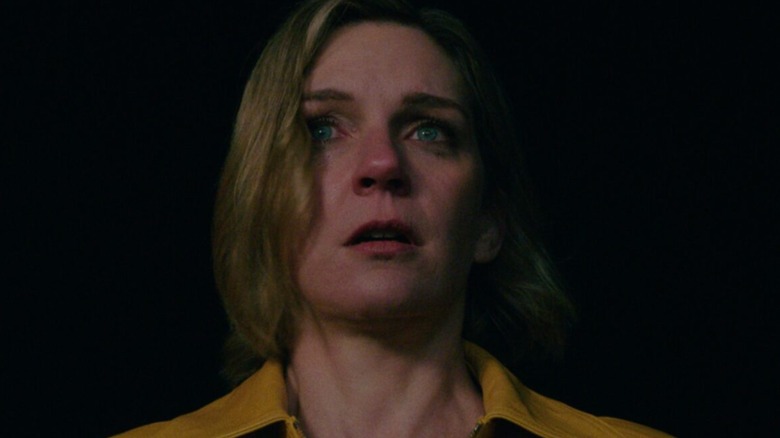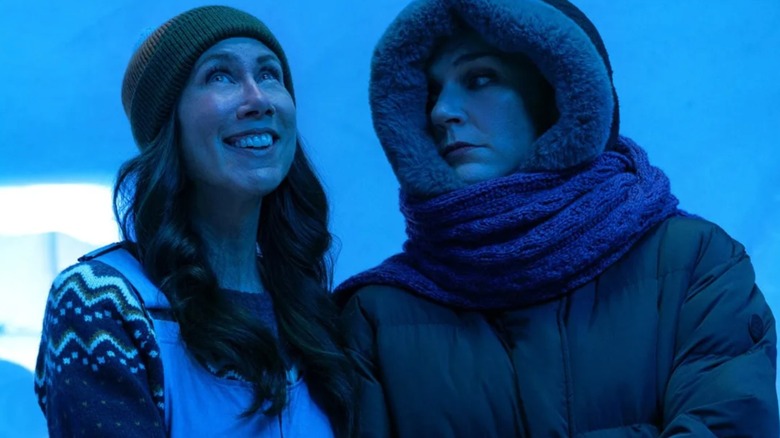Pluribus Episode 4 Reveals The Darkest Part Of Carol Sturka's Backstory Yet
Spoilers for "Pluribus" episode 4 follow.
Four episodes into "Pluribus," and we haven't gotten too much about series' lead Carol Sturka's (Rhea Seehorn) backstory just yet. What we do know is that Carol is an author, writer of the "Wycaro" books about Captain Lucasia and her lover, sexy pirate Raban. The books are beloved by many, but not Carol herself. She's also a closeted lesbian whose girlfriend Helen (Miriam Shor) was her manager. The latest episode, "Please, Carol" has revealed another detail that may explain why Carol didn't seem connected with her family outside of Helen.
During a conversation with her hive "chaperone" Zosia (Karolina Wydra), Carol demands Zosia explain to her what "Freedom Falls" means. Zosia enlightens us to what Carol already knows: When Carol was 16 years old and realized she was queer, her mother sent her to Camp Freedom Falls, a conversion therapy camp in Tennessee. The "conversion" didn't take, but Carol's relationship with her mother seemingly didn't survive.
In the next scene, Carol (to cover her stealing a truth serum anesthetic to use on Zosia) demands the hive give her some heroin. She's done the drug before, flippantly explaining "sophomore year was tough." If she means sophomore year of high school, when she would've been about 16 — you connect the dots.
"Pluribus" has implied that one reason Carol stayed in the closet was for her career. She wrote smut aimed at straight women, so better to have her fans think she was one of them. She first envisioned Raban as a woman but decided heteronormativity opened up a bigger market of readers. That's part of the reason that she resents her books; not just because they're "mindless crap" but because she's pretending, in her words and her life, to be someone else.
In Pluribus, Carol spent part of her childhood in conversion therapy
Carol's experience with conversion therapy recontextualizes her character and the series' conflict, because the episode draws a direct line from her past to what she's experiencing in the present. Then and now, Carol is surrounded by people trying to change her for "her own good." Of course she still has scars from conversion therapy, an utterly discredited practice that can cause depression and trauma when it's inflicted. (To the point it's been banned for minors in 23 U.S. states.)
Zosia tries to again reassure Carol that the joining will be for the best: "Soon enough, you'll understand everything and you will feel so much better." As Carol notices, those words could've come out of the mouth of a Freedom Falls counselor. Those counselors were "some of the worst people I have ever known, and they smiled all the time, just like you [members of the hive]." That adds another layer to why she's so distrusting of the "Joined." It's not in spite of their insistent positivity, it's because of it.
Echoing "Invasion of the Body Snatchers," "Pluribus" is a parable about individuality. By being forced into conversion therapy as a teen, Carol has already experienced a group trying to take away a unique part of her identity so she could be, supposedly, like everyone else. Queerness is more accepted nowadays than it would've been during Carol's adolescence (if we go by Seehorn's age, the late 1980s) but LGBTQ+ people are still a minority, standing apart from a greater whole. Like Carol's occupation as a writer, or a creative person invested in freedom of expression, her sexuality supports the central theme of "Pluribus" — that uniqueness is worth retaining.
"Pluribus" is streaming on Apple TV with new episodes on Friday.

